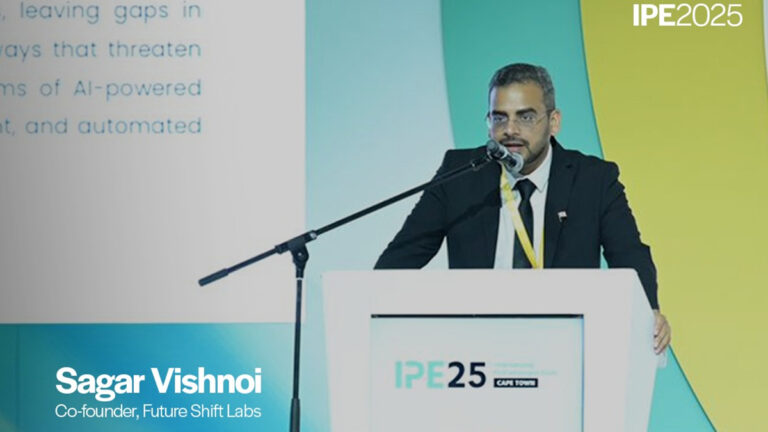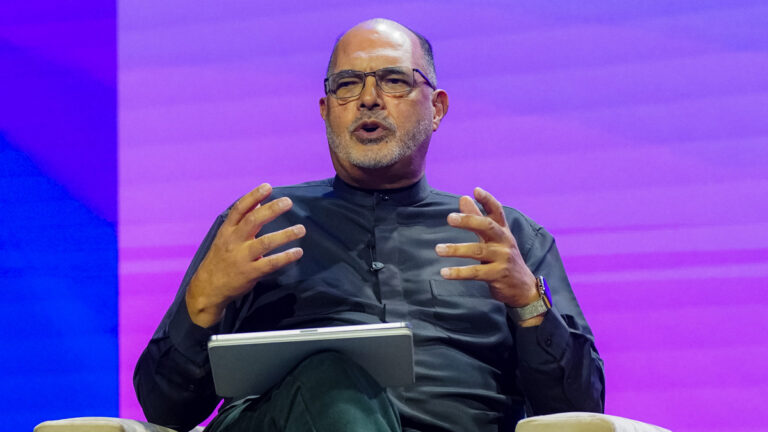SARS commissioner Edward Kieswetter.
The government is “not organised to win,” and the presidency must be more proactive to ensure technology is adopted to increase efficiency.
This is according to South African Revenue Services (SARS) commissioner Edward Kieswetter, speaking yesterday at the Microsoft AI Tour in Johannesburg.
Talking about the adoption of technology and the importance of overarching vision and strategy, Kieswetter said only the Presidency has the authority to set clear government key performance indicators (KPIs) and to make the entire Cabinet approachable and accountable.
“Government is not organised to win… it is organised in functional, segregated silos, often with competing KPIs that make them pursue issues in the narrow interests of the department, rather than leveraging the whole government.”
The commissioner said the presidency should set clear ‘whole of government’ KPIs to hold the entire Cabinet accountable, rather than individual KPIs for each department or minister.
He added, “Only the presidency can sponsor the whole of government-enabling infrastructure, without which we cannot have interdisciplinary and cross-functional collaboration. For example, we’re really pushing hard for the unique digital identity for every South African and every business. We don’t have that yet.”
Secondly, Kieswetter added, a common portal for access to all government services is needed, as are “common datapoints with only one version of the truth, for every person or jurisdictional person.”.
He said there is a need for a single platform to track all engagement—whether it is consumption of government services or supplying services to government.
“We would advocate a single platform and a single dispersing system. SARS disperses over R400 billion in refunds, and we do so with high stability and integrity…the only time we get it wrong is when the taxpayer tries to fool us.
“Government, in addition to having this enormous resource called the refund system, gives money to citizens through NSFAS, SASSA, TERS (UIF fund), and all of that is riddled with corruption and inefficiency and cost. Until we have a unified vision, the whole of government will not work, and I’m pleased to see that realisation is now dawning, and I’m hoping as the whole of government we can move towards this.”
Kieswetter also provided some background on how SARS is adopting technology to enable its revenue collections, with over R2 trillion collected and over R400 billion paid out in refunds in the last fiscal year.
“We have over 200 interconnected sites, deploying 14,000 end-user devices and serving more than 33 million taxpayers with an uptime of 99.9%. Every day, our 250 systems and applications handle 232 million messages, our 6,600 databases process 1.2 billion records, and our 3,000 servers store over 30 petabytes of data, or about 15 times the Netflix movie library.
“That gives you the scale of what happens under the hood. We wouldn’t be able to do that without smartly embracing and deploying technology at data sites and every AI technology we can lay our hands on.”
In addition to explaining how the revenue service has adopted machine learning to enable five million taxpayers to be automatically assessed, without needing to submit any documents, Kieswetter said this is something he ultimately wants to see rolled out for all taxpayers.
The Lwazi SARS chatbot was upgraded in November by integrating Azure and OpenAI services, he said, adding it had already generated 300,000 responses to users in just two months.
The first phase is to provide general advice and guidance, pulling from policies and reference documents. The next phase, he outlined, is to introduce hyper-personalisation, so the system can access every taxpayer’s personal record and provide individualised responses. “We will deploy that this year.”
Biometrics will also be introduced, said Kieswetter, particularly live facial recognition, to reduce fraud and improve taxpayer experience.
“Registration of a taxpayer is not a risk-free transaction for us [SARS],” he said. “People register for VAT, for example, with the only intent of defrauding the refund system. So, we constantly have to balance risk and service, and AI technologies allow us to do that.
“People have tried to con the system by putting photographs or other images, and the intelligent liveliness technologies behind that caught them out; in a number of cases, we’re pursuing it for further criminal investigation for fraudulent registration.”





 The CEO of Yellow Card Financial, a pan-African-focused digital assets exchange, says he has received increased interest from traditional banks and expects regulators to act quicker on establishing rules for the sector following the inauguration of crypto-friendly US President Donald Trump.
The CEO of Yellow Card Financial, a pan-African-focused digital assets exchange, says he has received increased interest from traditional banks and expects regulators to act quicker on establishing rules for the sector following the inauguration of crypto-friendly US President Donald Trump. International remittances using cryptocurrencies are popular among Africans in the diaspora and relatives on the continent, and their adoption is also growing among small and medium-sized companies that are turning to stablecoins for transactions. Maurice said the question now is if the continent can maintain the momentum and keep its lead in the crypto market.
International remittances using cryptocurrencies are popular among Africans in the diaspora and relatives on the continent, and their adoption is also growing among small and medium-sized companies that are turning to stablecoins for transactions. Maurice said the question now is if the continent can maintain the momentum and keep its lead in the crypto market.




 LG Electronics, working with Qualcomm Technologies, introduced the ground-breaking Cross Domain Controller (xDC) platform for vehicles at CES 2025 in Las Vegas.
LG Electronics, working with Qualcomm Technologies, introduced the ground-breaking Cross Domain Controller (xDC) platform for vehicles at CES 2025 in Las Vegas.

 The team expects to conclude the cross-country journey in Durban on 10 March, where the Model X and the SolarButterfly will be loaded onto a boat for the next leg of the global tour.
The team expects to conclude the cross-country journey in Durban on 10 March, where the Model X and the SolarButterfly will be loaded onto a boat for the next leg of the global tour.